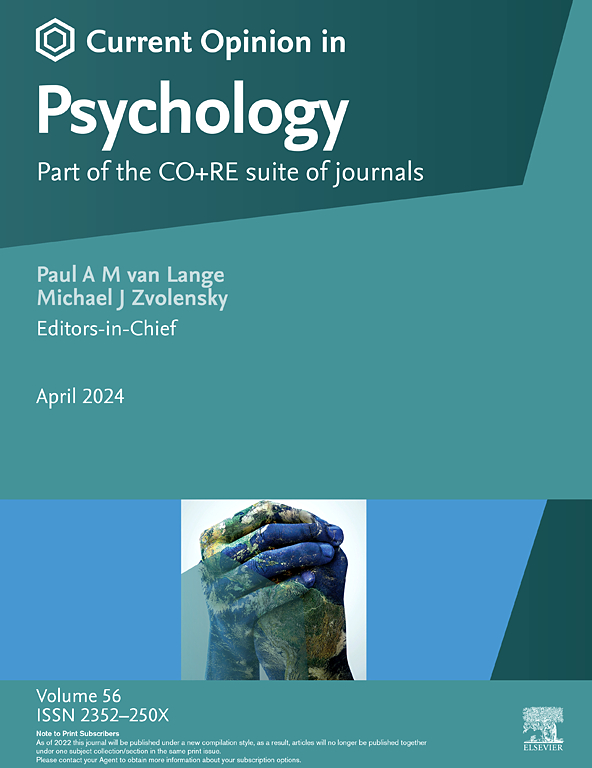No one sees you quite like I do: The social relations model in personality perception
IF 6.9
2区 心理学
Q1 PSYCHOLOGY, MULTIDISCIPLINARY
引用次数: 0
Abstract
The Social Relations Model (SRM) offers a comprehensive framework for examining how individuals perceive personality traits in others, decomposing personality perceptions into perceiver, target, and relationship effects. These components demonstrate meaningful variation across traits, time, classes of relationships, and levels of acquaintance. Nevertheless, while target and perceiver effects have been well-documented, the relationship effect, capturing idiosyncratic, dyad-specific personality perceptions, remains underexplored despite accounting for substantial variance and predicting meaningful outcomes. Relationship effects are likely shaped by multiple factors, including unique behaviors, unique interpretations by perceivers, unique situations, unique biases, or dyadic fit. Recent developments leading to the extended SRM (eSRM) further enrich the model by introducing the ability to capture individual-level variability in how perceivers utilize SRM components. Importantly, despite practical challenges, including the resource demands of round-robin designs and the statistical complexity of the model, technological and collaborative innovations grounded in open science practices offer pathways to broaden the application of the SRM. This review aims to position the SRM as an increasingly promising and accessible tool for the study of personality perception and to highlight that additional research utilizing the SRM is needed to advance our understanding of the causes and consequences of relationship effects in personality perception.
没人能像我一样看待你人格知觉中的社会关系模型
社会关系模型(SRM)为研究个体如何感知他人的人格特征提供了一个全面的框架,将人格感知分解为感知者、目标和关系效应。这些成分显示出在性格、时间、关系类别和熟人水平上有意义的变化。然而,尽管目标和感知者效应已经被充分证明,关系效应,捕捉特质,特定的人格感知,仍然没有得到充分的探索,尽管考虑了大量的差异并预测了有意义的结果。关系效应可能受到多种因素的影响,包括独特的行为、感知者的独特解释、独特的情况、独特的偏见或二元契合。最近的发展导致了扩展SRM (eSRM),通过引入捕捉感知者如何利用SRM组件的个人水平可变性的能力,进一步丰富了模型。重要的是,尽管存在实际挑战,包括循环设计的资源需求和模型的统计复杂性,但基于开放科学实践的技术和协作创新为扩大SRM的应用提供了途径。本综述旨在将SRM定位为一个越来越有前途和可获得的人格知觉研究工具,并强调需要利用SRM进行更多的研究,以促进我们对人格知觉中关系影响的原因和后果的理解。
本文章由计算机程序翻译,如有差异,请以英文原文为准。
求助全文
约1分钟内获得全文
求助全文
来源期刊

Current Opinion in Psychology
PSYCHOLOGY, MULTIDISCIPLINARY-
CiteScore
12.10
自引率
3.40%
发文量
293
审稿时长
53 days
期刊介绍:
Current Opinion in Psychology is part of the Current Opinion and Research (CO+RE) suite of journals and is a companion to the primary research, open access journal, Current Research in Ecological and Social Psychology. CO+RE journals leverage the Current Opinion legacy of editorial excellence, high-impact, and global reach to ensure they are a widely-read resource that is integral to scientists' workflows.
Current Opinion in Psychology is divided into themed sections, some of which may be reviewed on an annual basis if appropriate. The amount of space devoted to each section is related to its importance. The topics covered will include:
* Biological psychology
* Clinical psychology
* Cognitive psychology
* Community psychology
* Comparative psychology
* Developmental psychology
* Educational psychology
* Environmental psychology
* Evolutionary psychology
* Health psychology
* Neuropsychology
* Personality psychology
* Social psychology
 求助内容:
求助内容: 应助结果提醒方式:
应助结果提醒方式:


